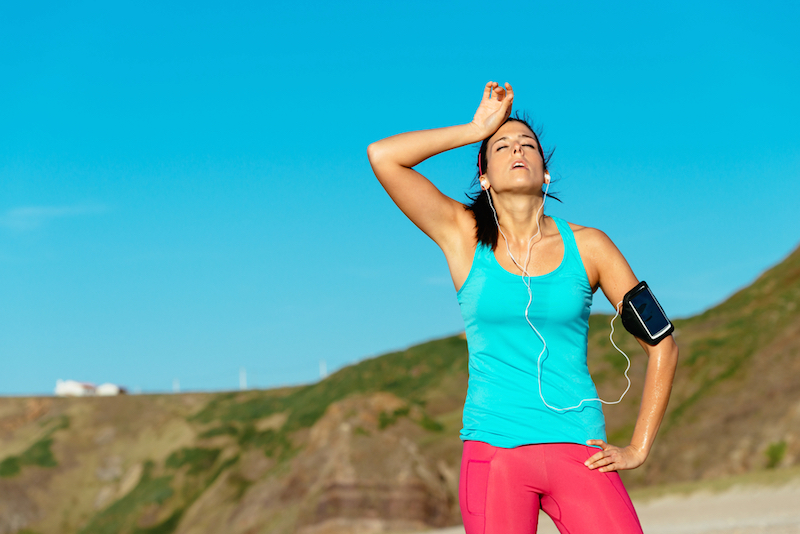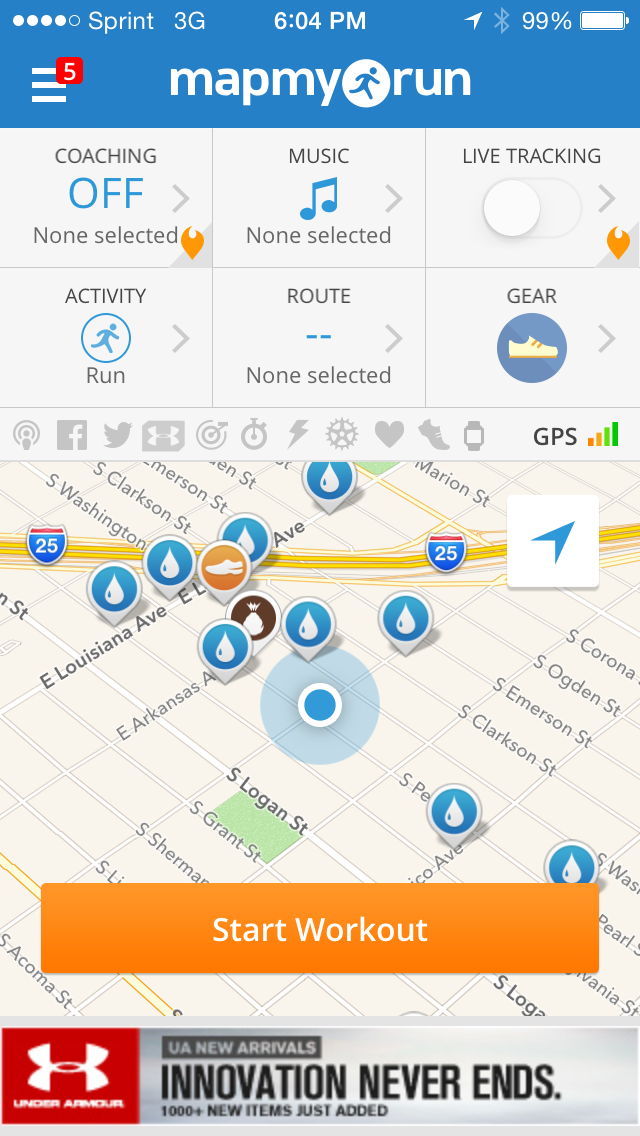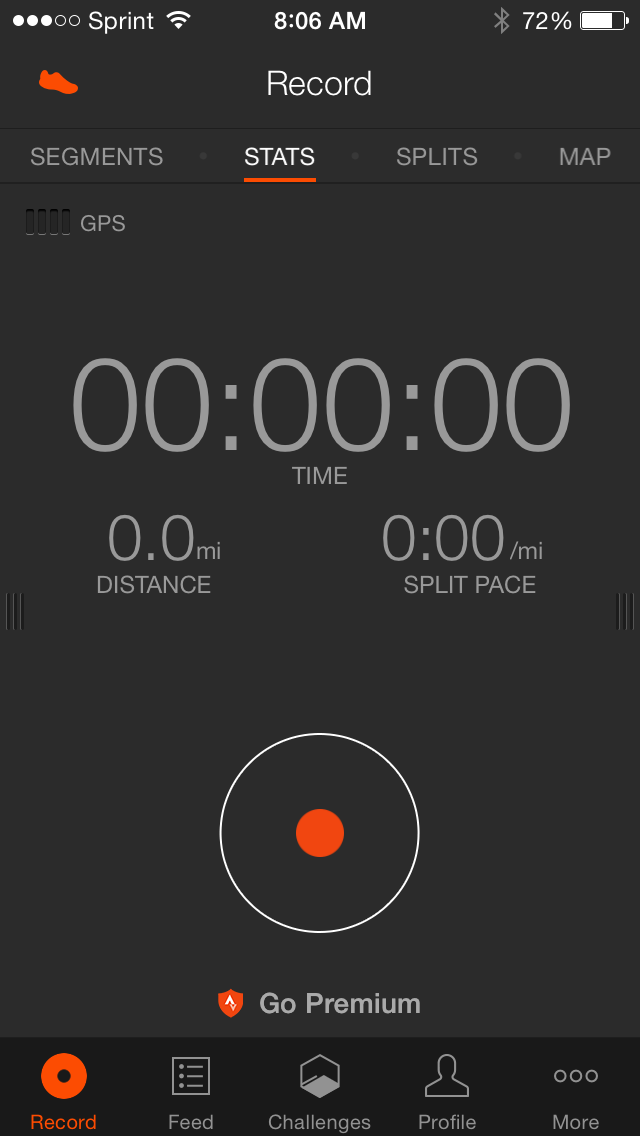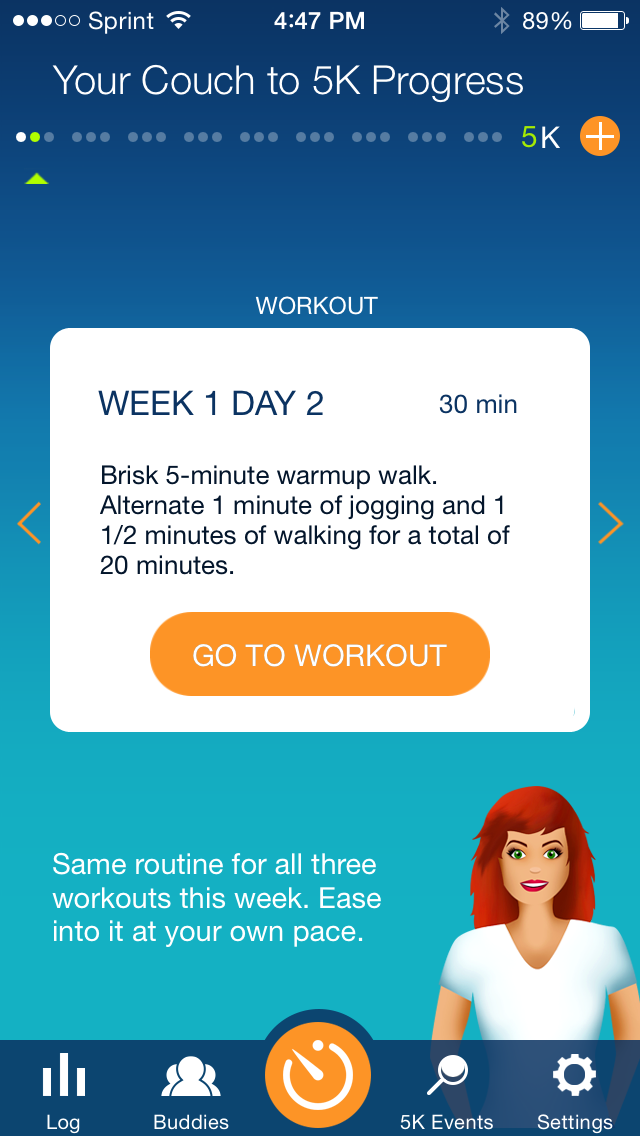Best Running Apps

The field of top running apps is a crowded one. Many free and cheap options exist to track your mileage, log your workouts and act as in-pocket personal trainers. We've put them through their paces to separate the wheat from the chaff and the winners from the losers.
The result? MapMyRun (free; iOS, Android) crosses the finish line as the best all-around app for runners. For no cost, this app has lots of features and is easy to use.
MapMyRun's recording function tracks distance, time, pace and estimated calories burned. There's an in-app music option, with a convenient (and large) Play button on the run-recording screen. The app, which is owned by Under Armour, has a built-in social networking component and also lets you share your stats on Facebook and Twitter. The app includes a pedometer to track your activity all day long, and a workout log where you can manually enter exercises that a phone can't readily record. There's also a food diary, for keeping tallies of calories consumed and calories burned all in one place. You can also record weigh-ins and track water consumption under the app's Nutrition tab. The interface isn't particularly stylish, but navigation is simple.
MapMyRun will trace your running routes on a map and save those routes for use later. If you're in a rut, you can check out Nearby Routes to see where others are running. There is an ongoing list of sponsored challenges, many of which include the opportunity to win prizes. And to top it all off, MapMyRun easily connects to a large array of external devices, including your Jawbone, Fitbit and any heart rate monitor. A gear tracker lets you log how many miles you've run in a particular pair of shoes and alerts you when it's time to buy new kicks.
MapMyRun has many customizable settings — for example, the timer has a delayed-start option (good for last-minute fiddling with earbuds or phone cases) and auto-pause so that if you stop running, the app stops recording until you start running again. Audio feedback will inform you of your distance, time, pace and splits every mile by default, but you can adjust those announcements to fit your own preferences.

All of the features listed so far are free. For additional perks, you can get an MVP membership, which costs $5.99 a month or $29.99 a year, and includes options like live tracking and audio coaching, custom splits and cadence analysis. One of the best upgrades with the MVP package is Route Genius. With this feature, you enter the length and type of the run you want, and MapMyRun will automatically create a route for you. That's the kind of feature that keeps you from circling the same block six times, trying to even out your mileage before you head home on a new route.
Runner-up
Sign up for the Live Science daily newsletter now
Get the world’s most fascinating discoveries delivered straight to your inbox.
Our runner-up earns its position by recognizing that runners often have a competitive drive. Strava (free; iOS, Android) is famous for its leaderboard system that lets users designate segments and then "race" other users for the top time on those segments. (The app was originally designed for cyclists, but more recently opened to runners.) Any user can explore these segments, but if you want real-time updates on your times, you'll need an upgrade for $5.99 a month or $59.99 a year. This upgrade also offers advanced goal setting, pace zone analysis and more detailed leaderboards, separated by age and gender. You'll even get a brag-worthy "suffer score" to show off how hard you're working during exercise.

The free version of Strava keeps track of your distance, split pace and routes, and lets you join "challenges" to motivate you to work toward a goal. A gear tracker records the mileage on your shoes so you know when to buy new ones, and you can connect to heart rate monitors or other sensors. If you prefer to keep your movements more private, Strava's enhanced-privacy setting allows only people you approve to see your activities and photos.
Strava's interface is sleek and attractive, with its black background and red graphics, and it's easy to navigate between screens. A tiny shoe or bike icon differentiates the running and cycling options, so there's no need to download multiple apps if you're a multisport warrior.
This app is best for runners who are inspired by stats, numbers and comparisons. If anyone's ever said you're obsessive about your workouts, Strava is probably for you. On the other hand, if you just want to get your daily jog out of the way each day, you might want to look elsewhere for motivation.
Other good picks
One good alternative is Nike+ (free; iOS, Android), which scores points for its intuitive interface and free coaching programs. Most apps save their personal-trainer features for paying customers, but the Nike+ basic app gives runners week-by-week workouts to work toward specific goals, like running a 5K. After you record a workout, this app will save a map of your route, as well as your time, pace, elevation change and calories burned. In-app music control is accessible from the run recording screen, and you can choose between recording outdoor or treadmill runs.
The Nike+ app also stands out for its social options. Runs can be shared with any of the big social media sites, as well as directly with friends within the Nike+ network. Users can set up their own challenges and invite friends to compete; the app also includes leaderboards so friends can see how they stack up against one another. The Cheer feature lets you post a real-time note on Facebook or Pinterest that indicates you're running. When someone comments on or likes that status, you will hear virtual cheering noises on your phone, turning a solitary run into a social event. Like most top running apps, Nike+ can connect to the Apple Health app and the Apple Watch.
As another big name in the running-app world, Runtastic (free; iOS, Android) is definitely a top pick. You can easily share data with Apple Health and MyFitnessPal, as well as post updates to Facebook and Twitter. Like Nike+, Runtastic has a cheering section feature, and you can also turn on live tracking so your social media followers know where you are. The basic features of Runtastic are quite comprehensive and include detailed statistics, a newsfeed and connectivity to external heart rate monitors and other sensors.
But a few features that are common on other running apps, such as auto-pause, come only with the Pro version of Runtastic, which costs $4.99 a month or $29.99 a year. The Pro version also gives you free access to one of Runtastic's standout features: Story Running. This feature lets you listen to original stories during your workout. Users of the free version of the app can buy stories individually, usually for about $0.99.
Wahoo Fitness (free; iOS, Android) makes it easy to toggle between outdoor and treadmill runs, and can also handle bike rides, whether outside or in spin class. The app is simple but rich in data, and it allows users to set custom laps on the go. Wahoo Fitness does not allow sharing on social media, but it does make it amazingly easy to export data or share it with other health apps. The app was originally designed to pair with the Tickr running strap but works with other heart rate monitors or as a stand-alone program.
RunKeeper (free; iOS, Android) is a popular choice with a full suite of functions, from goal setting to in-app challenges. We found RunKeeper's interface to be a bit more difficult to navigate than other apps, but appreciated the easy-to-use newsfeed and family and friend leaderboard. RunKeeper is also easily customized. Users can choose to include a countdown to start their workout, and turn auto-pause on or off so that when they stop running, RunKeeper stops recording. To compare your workouts over time, get additional training plans and do away with ads, you'll have to upgrade to the Elite version at $4.99 a month or $29.99 a year.
Specialty choices

While we've focused on general-use running apps that should please beginners and marathoners alike, a number of options are geared for more specific needs. A special mention goes to Couch to 5K ($1.99; iOS, Android), which aims to turn sedentary people into reasonably fit joggers. The app includes preset workouts that last 30 minutes, to be done three times a week for nine weeks. If you're a beginner in need of structure, or if you're getting back to exercise after some time away, this is the app for you. Users can choose between four different audio coaches, including the chipper Constance, no-nonsense Billie, military Sergeant Block or zombie (yes, zombie) Johnny Dead. The app works with external music players.
Speaking of zombies, turn your run into a game with the infamous Zombies, Run! app (free; iOS, Android). This app fills your earbuds with the groans of the undead and urges you onward with the mission to gain supplies for the survivors of the zombie apocalypse. The free version of this app comes with four initial zombie missions, with one additional mission added per week. An upgrade to the Pro version for $2.99 a month or $19.99 a year unlocks more than 200 missions. Be warned that some Android users complain that this app crashes frequently.
Follow Stephanie Pappas on Twitter and Google+. Follow us @livescience, Facebook & Google+. Original article on Live Science.

Stephanie Pappas is a contributing writer for Live Science, covering topics ranging from geoscience to archaeology to the human brain and behavior. She was previously a senior writer for Live Science but is now a freelancer based in Denver, Colorado, and regularly contributes to Scientific American and The Monitor, the monthly magazine of the American Psychological Association. Stephanie received a bachelor's degree in psychology from the University of South Carolina and a graduate certificate in science communication from the University of California, Santa Cruz.









